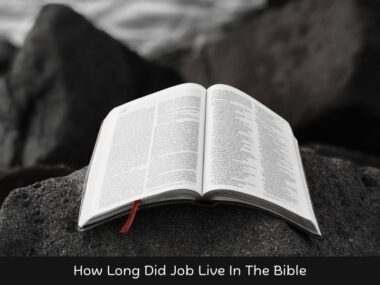The story of Job raises a haunting question: Why did God punish Job in the Bible? At first glance, Job’s intense suffering—losing his children, health, and wealth—appears to be divine punishment. But a deeper look at the narrative reveals a more complex and spiritually enriching message. Job’s trials were not about retribution for sin but about testing faith and revealing divine sovereignty. This article explores the layers of Job’s experience, analyzing why his suffering occurred, how he responded, and what it ultimately teaches us about God’s nature, human faith, and the mystery of undeserved hardship.
The Context of Job’s Trials
Job was described as “blameless and upright,” a man who feared God and turned away from evil. Living in the land of Uz, he was wealthy, respected, and deeply faithful. The biblical account makes it clear that Job’s suffering was not a result of sin or wrongdoing, but rather part of a divine narrative. This context is vital—Job’s trials challenge the idea that suffering is always punishment for sin. Understanding his character sets the stage for appreciating the spiritual tension in his story: how could such a faithful man be subjected to so much pain?
The Setup in Heavenly Court
The story shifts dramatically from Earth to a celestial courtroom scene, where God and celestial beings convene. Among them is Satan—“the accuser.” God points to Job as an exemplary servant, but Satan challenges Job’s loyalty, suggesting it’s only due to his blessings. In this divine setup, God allows Satan to test Job’s faith through suffering. This exchange is crucial in answering why Job suffered: it wasn’t punishment but a test allowed by God to prove the depth of Job’s righteousness. It reframes Job’s trials not as punitive measures but as part of a larger spiritual dialogue.
The Role of Satan
Satan plays the role of the skeptic in the heavenly council. He challenges the idea that Job’s devotion is genuine, implying that it’s merely transactional. “Take away his blessings,” Satan argues, “and he will surely curse You.” By allowing Satan to test Job, God does not abandon His servant but rather entrusts him with a divine purpose—to demonstrate authentic, unwavering faith. Importantly, Satan’s role is limited; he acts only within the boundaries set by God. Job’s suffering, therefore, is not a punishment from God, but an accusation-driven trial initiated by the adversary under divine permission.
Initial Wealth and Loss of Job
Job’s life begins with immense prosperity—he owns thousands of livestock, employs many servants, and has a large family. This wealth is not merely material; it symbolizes God’s favor and Job’s righteous standing. When calamity strikes—his livestock stolen, servants killed, children lost—Job’s status plummets overnight. This devastating sequence is meticulously described to emphasize the sheer scale of his loss. Yet, it’s important to note that these losses come not as punishment for sin but as part of the allowed test. Job’s experience challenges the simplistic view that wealth equals righteousness and suffering equals divine disapproval.
Job’s Response to Suffering
Despite unimaginable loss, Job’s initial response is one of profound reverence: “The Lord gave, and the Lord has taken away; blessed be the name of the Lord.” This reaction reveals the depth of his faith. He does not curse God or accuse Him of injustice. Instead, Job expresses a raw but faithful grief, refusing to sin with his lips. His response defies Satan’s prediction and sets the tone for the deeper theological journey ahead. Job’s faith is shaken but not broken, and this early response is key in understanding why his suffering was not divine punishment.
Job’s Immediate Reaction
Job mourns. He tears his robe, shaves his head, and falls to the ground in worship. These actions reflect genuine anguish but also submission to God’s will. His immediate reaction humanizes him—Job is not a stoic figure but a man deeply impacted by loss. Yet he doesn’t turn bitter. Instead, he clings to his faith, expressing that even in tragedy, God is sovereign. This heartfelt reaction shows that grief and faith are not mutually exclusive. It is Job’s honest grief that strengthens his credibility as a faithful servant—not one punished, but one tested.
The Role of Faith and Humility
Job’s suffering becomes a canvas for displaying both faith and humility. He admits his confusion and despair but continues to seek God. He never claims superiority over divine wisdom. As his pain deepens, Job maintains reverence, even when questioning God’s justice. His humility is not about silence—it’s about remaining open to God’s purpose, even when he cannot understand it. This posture reveals the difference between arrogant questioning and faithful wrestling. Job’s humility proves that his relationship with God is not based on circumstance but on trust, making his trial a testament to sincere, enduring faith.
Expressing Grief Through Prayer
One of the most profound aspects of Job’s story is how he channels grief into prayer. He doesn’t suppress his sorrow; he expresses it, often in poetic and emotionally raw laments. Job’s prayers are not always pretty—they’re sometimes accusatory, filled with desperation and longing. But they are prayers nonetheless. He speaks to God, not away from Him. This dialogue shows that prayer is not just praise or petition—it can be a space for processing pain. Job’s willingness to speak his heart, even in bitterness, models authentic communication with God, reinforcing that honesty in prayer is not rebellion.
The Role of Job’s Friends
When Job’s three friends—Eliphaz, Bildad, and Zophar—arrive, they initially sit in silence, mourning with him. However, they soon begin offering explanations for his suffering, insisting that he must have sinned. Their theology is simplistic: suffering equals guilt. While perhaps well-intentioned, their words become hurtful, even accusatory. Instead of comforting Job, they deepen his anguish. Their failure reveals the limitations of human wisdom and the dangers of offering shallow answers to deep pain. Their role in the narrative shows how not to respond to suffering—by prioritizing being “right” over being compassionate.
The Arrival of Eliphaz, Bildad, and Zophar
Eliphaz, Bildad, and Zophar arrive to comfort Job, but their presence quickly becomes more accusatory than consoling. Initially, they mourn with him in silence—a respectful and appropriate act. But when they begin to speak, each offers the same flawed theology: Job must be suffering because he sinned. Eliphaz appeals to mystical visions, Bildad leans on tradition, and Zophar speaks with harsh certainty. They believe they are defending God’s justice, but their assumptions distort the truth. Their arrival marks a turning point, shifting Job’s suffering from physical pain to spiritual and emotional isolation from his friends.
Inadequate Explanations and Comfort
The speeches of Job’s friends fail to bring comfort because they rely on a rigid understanding of divine justice. By insisting that Job’s suffering must be punishment for sin, they invalidate his pain and wrongly accuse a blameless man. Their theology reduces God to a mere enforcer of cause and effect, unable to operate in mystery or grace. Instead of listening or offering compassion, they argue. This teaches us that not all counsel is wise and not all theology is helpful. Sometimes, silence and empathy offer more comfort than hollow explanations trying to justify suffering.
Lessons on Human Companionship
Job’s experience with his friends teaches powerful lessons about human companionship in times of suffering. True friends sit with us in grief without rushing to fix it. They don’t weaponize theology or force explanations where mystery exists. Job’s friends meant well, but they prioritized being correct over being compassionate. Their failure reminds us how vital it is to support others without judgment. Compassionate presence speaks louder than perfect answers. Real companionship honors another’s pain, acknowledges its complexity, and stands beside them, not above them. Job’s story calls us to be better friends in the face of suffering.
God’s Role and Revelation
After much silence, God finally responds—not with direct answers, but with questions. From a whirlwind, He asks Job where he was when the world was created, highlighting Job’s limited perspective. God does not explain why Job suffered, nor does He justify His actions. Instead, He reveals His sovereignty, wisdom, and power. This divine appearance re-centers the story on God’s majesty and mystery. God’s role is not to punish Job, but to elevate his understanding. In revealing Himself, God shows that His ways transcend human reasoning, inviting Job (and us) to trust even without full understanding.
God’s Intervention in the Debate
When God enters the conversation, He directly rebukes Job’s friends for misrepresenting Him. Interestingly, while Job questioned God, he is not condemned—because he spoke honestly from a place of pain. The friends, however, claimed to speak on God’s behalf, offering false certainties about divine justice. God commands them to seek Job’s intercession, affirming Job’s righteousness. This moment reframes the entire narrative: Job was never being punished. Instead, his story becomes a testimony of faith under fire. God’s intervention affirms that sincere questioning is more faithful than presumptuous certainty. Job’s integrity, not his perfection, is what God honors.
Divine Justice and Omnipotence
God’s speech reveals that divine justice operates on a plane far beyond human comprehension. Through a series of questions about creation, the cosmos, and nature, God illustrates His omnipotence and the vast complexity of His governance. Justice, as portrayed here, is not linear or predictable; it’s interwoven with divine wisdom, unseen purposes, and cosmic balance. Job, humbled by this revelation, realizes that his suffering was not about guilt or punishment but about participating in a larger story beyond his understanding. Divine justice, therefore, is not absent but deeply layered—rooted in a justice that is perfect, though mysterious.
The Transformation of Job
Job’s encounter with God transforms him. He moves from demanding answers to accepting divine mystery. He says, “I had heard of you by the hearing of the ear, but now my eye sees you.” Job repents—not for sin that caused his suffering, but for speaking about things too wonderful for him to understand. This repentance marks a spiritual breakthrough. Job does not just get his fortunes restored; he is changed internally. His transformation is about perspective—learning to trust God not just in blessing but in bewilderment. Job’s journey shifts from questioning to communion, from complaint to quiet reverence.
Key Lessons from Job’s Experience
The story of Job offers enduring lessons about suffering, faith, and God’s nature. First, suffering is not always a sign of divine punishment—it can be a test, a refinement, or a mystery. Second, honest dialogue with God is not irreverence; it’s a vital part of faith. Third, true friends support with empathy, not easy answers. Most importantly, the story shows that God values integrity, humility, and relationship over blind obedience. Job is honored not because he never questioned, but because he never walked away from God. His story is a roadmap for faithful endurance through life’s darkest valleys.
Suffering as a Non-Punitive Experience
Job’s story dismantles the belief that suffering is always a result of wrongdoing. From the beginning, the text emphasizes Job’s righteousness. His trials are permitted, not inflicted, by God—and they serve a higher purpose than retribution. This shifts our understanding of divine interaction with human pain. Sometimes, suffering has nothing to do with personal fault. Instead, it can become a stage for spiritual growth, the testing of faith, or the revealing of divine wisdom. Job’s story urges us to reject shallow assumptions about suffering and instead seek deeper spiritual truths beneath the pain.
Trusting in Divine Plan and Justice
Though Job never receives a full explanation, he ends his journey by trusting in God’s character rather than His reasoning. This is the turning point. Job moves from demanding to resting in God’s sovereignty. His faith matures—not because he got answers, but because he encountered God Himself. In doing so, Job teaches us that divine justice is real even when invisible. Trusting in God doesn’t mean we always understand Him; it means we believe His heart is good even when His hand seems hard. Job’s trust becomes a powerful example of mature, tested, and rewarded faith.
Extracting Deeper Truths About Faith
Job’s narrative invites us to go beyond surface faith—the kind rooted in blessing—and explore a deeper trust that holds even in loss. Faith is not proven in prosperity, but in perseverance. Job’s cries, questions, and worship all demonstrate that faith involves struggle, not just serenity. His story shows that God is big enough for our doubts and strong enough to redeem our pain. Job’s experience reveals that a relationship with God is not based on performance but on presence—on staying engaged, honest, and humble even in confusion. This is the essence of resilient, authentic faith.
Conclusion
So, why did God punish Job in the Bible? In truth, He didn’t. Job’s suffering wasn’t punishment but a divine test allowed for purposes greater than human understanding. His trials revealed the complexity of faith, the limits of human wisdom, and the majesty of God’s sovereignty. Through it all, Job clung to God, even when it hurt. His story reminds us that suffering isn’t always a sentence—it can be a sacred space where trust is refined, humility is learned, and faith is made real. Job’s journey is not about punishment, but about perseverance and the God who walks with us through it.







